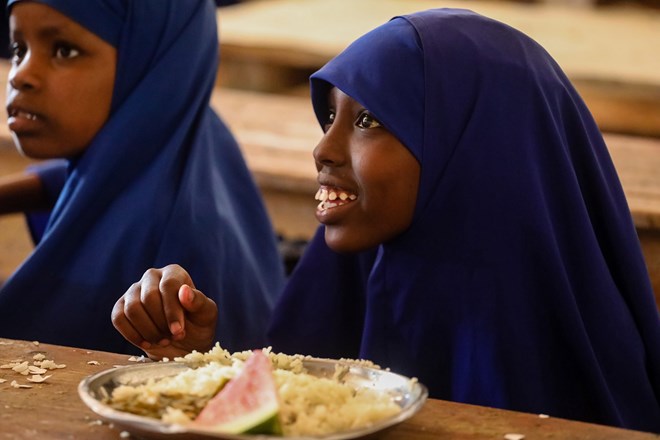
Monday April 19, 2021
How the school feeding component of a WFP and UNICEF programme, backed by German funding, is keeping kids well-nourished and well-educated while boosting local markets

Pupils at Jabuuti primary school in Mogadishu enjoying lunch. Photo: WFP/Ismail Taxta
“I get lunch every day and when I go back home, I am full,” says Abdifatah Mohamed, a first-grader in Jabuuti Primary School in Mogadishu, the capital city of Somalia. “We have just gotten new types of meals; I didn’t have this before. I am very happy to come to school.”
“I love eating meals at school; today, my classmates and I were talking about hot meals, because [they] have made us very happy,” adds Saabrinin Mohamed, one of Abdifatah’s schoolmates. “I’d like to study at this school until I grow up. In the future, I would like to be a doctor.”
Abdifatah and Saabrinin are two of 35,000 students to be covered under a joint resilience and education programme being implemented by the United Nations World Food Programme (WFP) and the United Nations Children’s Fund (UNICEF), backed by funding from Germany. Running for two and a half years in 69 schools across the Banadir, Lower Juba and Gedo regions, the programme provides young school-aged children with better access to basic education and quality early childhood development, and adolescents with better life skills.
As part of this programme, schools are supported to provide two hot meals per day — breakfast and lunch — for pupils. This provides an incentive for parents to send their kids to school, resulting in a marked improvement in both enrolment and retention, and helps ensure that children have the energy to concentrate on their studies. It’s also an important safety net for poorer households that might otherwise struggle to keep their children fed.
“There has been a change in the students in the classroom; now, every day new students come to school. [The programme] is encouraging school children to receive both food and education,” says Hawo Ali Aden, who teaches art and practical skills at Jabuuti, and whose own children attend the school. “When the students are provided with free meals plus education, it motivates them — and they don’t complain about being hungry,” agrees Jawahir Ahmed Sulayman, another teacher at the school. “The students… are [no longer] worried about what to eat.”
The programme takes a community-led, home-grown approach to school feeding, providing schools with cash vouchers that enable them to buy food directly from local retailers — an important boost for local economies. Community education committees manage food purchasing, storage, record-keeping and cooking. These committees receive support and training to help them select a nutritionally balanced menu; the end result is that school children receive the blend of nutrients they need, from the local food they most enjoy.
To further support the school feeding programme, work is also underway to renovate kitchens and install new facilities such as fuel-efficient stoves in some of the schools, including Jabuuti. “I have seen a big difference… we [now] have a water tank, a sink where we wash our hands, a place where we can put pots, and new electrical appliances,” says Ahmed Ali Ahmed, a chef at the school. “It contributes to the hygiene of the kitchen.” Other elements of the programme include health and nutrition education and behavioural change communication for pupils, parents and community members, and the cultivation of kitchen gardens.
Key to the success of the programme is strong collaboration between WFP, UNICEF and counterparts in government, in particular the Ministry of Education, Culture and Higher Education and the Ministry of Health. Ultimately, the school feeding component will be handed over to a special school meals unit within the Ministry of Education, Culture and Higher Education, ensuring its long-term sustainability.